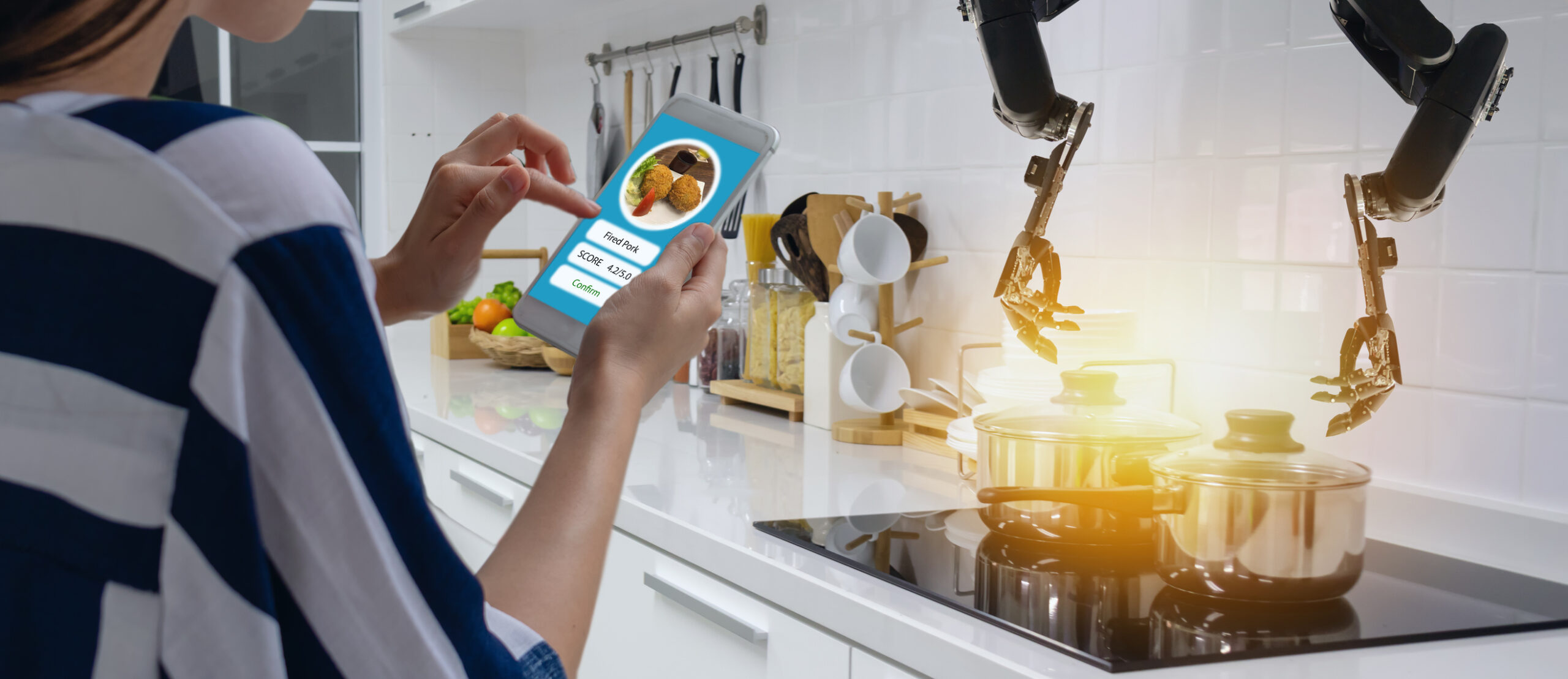Introduction:
In the heart of UK kitchens, a culinary revolution is underway, propelled by the integration of Artificial Intelligence (AI) into everyday cooking. AI-powered kitchen assistants are transforming the way meals are prepared, offering convenience, efficiency, and a touch of innovation. This article explores the impact of AI on cooking in the United Kingdom, delving into the features that make these assistants stand out, the benefits they bring to households, and the future of smart cooking in the UK.
The Changing Landscape of Kitchen Technology
Rise of Smart Homes:
As the concept of smart homes gains traction, the kitchen is becoming a focal point for technological innovation. AI-powered kitchen assistants are at the forefront of this evolution, promising a seamless and intelligent cooking experience.
Integration of Voice Control:
Voice-controlled AI assistants, such as Alexa and Google Assistant, have found their way into kitchens, allowing users to execute tasks hands-free. From setting timers to finding recipes, voice commands simplify the cooking process.
Connected Appliances:
AI’s influence extends beyond standalone assistants. Connected appliances, including smart ovens, refrigerators, and coffee makers, form an ecosystem that collaborates to streamline cooking tasks and enhance overall kitchen efficiency.
Features that Define AI-Powered Kitchen Assistants
Voice Recognition:
Accurate voice recognition is a hallmark of AI-powered kitchen assistants. Users can issue commands, ask questions, or dictate shopping lists with ease, creating a hands-free cooking experience.
Recipe Suggestions and Guidance:
AI assistants leverage vast databases of recipes to provide suggestions based on user preferences and dietary restrictions. They guide users through each step of the cooking process, offering tips and alternatives.
Meal Planning and Grocery Shopping:
AI assists in meal planning by suggesting recipes for the week and creating shopping lists based on selected recipes. This streamlines the grocery shopping process, ensuring users have all the necessary ingredients on hand.
Appliance Integration:
Seamless integration with smart appliances allows AI assistants to control various kitchen devices. Users can preheat ovens, adjust cooking temperatures, or start coffee makers through voice commands or mobile apps.
Adaptive Learning:
Some AI-powered kitchen assistants employ adaptive learning algorithms, refining their recommendations based on user habits, preferences, and feedback. This personalization enhances the user experience over time.
Nutritional Analysis:
AI can analyze the nutritional content of recipes, helping users make informed dietary choices. This feature is particularly valuable for those with specific health goals or dietary restrictions.
Benefits of AI-Powered Kitchen Assistants for UK Homes
Time Efficiency:
AI-powered kitchen assistants streamline the cooking process, saving users valuable time. From meal planning to guided recipes, these assistants ensure that every step is optimized for efficiency.
Enhanced Recipe Variety:
The vast databases accessed by AI assistants introduce users to a diverse range of recipes, encouraging culinary exploration. Users can easily discover and try new dishes, expanding their cooking repertoire.
Reduced Food Waste:
AI’s ability to assist in meal planning and create precise shopping lists helps minimize food waste. Users buy only the ingredients needed, reducing the likelihood of perishables going unused.
Improved Cooking Skills:
With step-by-step guidance and tips provided by AI assistants, users can enhance their cooking skills. This educational aspect encourages confidence in the kitchen and fosters a love for home-cooked meals.
Convenience for Multi-Tasking:
Busy households benefit from AI-powered assistants by allowing users to multitask in the kitchen. Whether checking a recipe, setting timers, or adjusting cooking temperatures, these assistants offer convenience and flexibility.
Voice-Activated Kitchen Control:
Voice-activated control of appliances adds an extra layer of convenience. Users can initiate tasks or make adjustments without having to physically interact with the devices, reducing interruptions during cooking.
AI in the UK Culinary Landscape
Adoption in Homes and Restaurants:
AI-powered kitchen assistants are making inroads into both homes and restaurants across the UK. From helping home cooks prepare family meals to supporting professional chefs in commercial kitchens, AI is becoming a culinary ally.
Cultural Adaptation:
AI’s integration into the culinary landscape reflects the UK’s embrace of technological advancements. As technology becomes an integral part of daily life, AI-powered kitchen assistants cater to the evolving preferences of the population.
Support for Dietary Preferences:
In a culturally diverse country like the UK, AI’s ability to cater to various dietary preferences and restrictions is particularly valuable. Users can customize their cooking experience based on cultural, ethical, or health considerations.
Challenges and Considerations
Data Security and Privacy:
The integration of AI in kitchens raises concerns about data security and privacy. Users must be mindful of the data collected by AI assistants and the security measures in place to protect sensitive information.
Dependency and Learning Curve
While AI simplifies many aspects of cooking, there’s a risk of users becoming overly dependent on these assistants. Additionally, some users may experience a learning curve as they adapt to new technologies.
Integration Compatibility:
Compatibility issues may arise when integrating AI assistants with existing kitchen appliances. Users should ensure that their devices are compatible and that software updates are regularly performed.
The Future of AI in UK Kitchens
Advancements in Voice Recognition:
Future developments may focus on improving voice recognition capabilities, making interactions with AI assistants even more seamless and natural.
AI-Enhanced Culinary Creativity:
AI’s ability to analyze vast culinary databases could lead to the development of AI-generated recipes, pushing the boundaries of culinary creativity and introducing unique flavor combinations.
Expanded Connectivity:
As smart home ecosystems continue to evolve, AI-powered kitchen assistants may become more interconnected. This could involve enhanced communication between appliances, creating a cohesive and synchronized kitchen environment.
Popular AI-Powered Kitchen Assistants in the UK
Amazon Alexa:
Alexa, integrated into devices like the Echo Show, is a versatile AI assistant that excels in voice recognition and smart home control. Skills and routines can be customized to suit kitchen needs.
Google Assistant:
Google Assistant, available on devices like Google Nest Hub, provides recipe suggestions, step-by-step guidance, and seamless integration with Google services for a connected cooking experience.
Apple Siri:
Siri, present on Apple devices like iPhones, iPads, and HomePods, offers voice-activated assistance in the kitchen. Integration with HomeKit allows users to control smart appliances using Siri commands.
Samsung Bixby:
Bixby, integrated into Samsung devices, including smart refrigerators and ovens, offers voice control and smart home integration. It aims to create a unified and intuitive cooking experience.
KitchenAid Smart Display:
KitchenAid’s smart display, powered by Google Assistant, is designed specifically for the kitchen. It provides hands-free recipe guidance, timers, and conversions, enhancing the cooking process.
Neato D7 Robot Vacuum:
While not a traditional kitchen assistant, Neato’s D7 Robot Vacuum, equipped with AI, can keep kitchen floors clean, allowing users to focus on cooking without worrying about spills.
Recommendations for Adopting AI-Powered Kitchen Assistants
Research Compatibility:
Before investing in an AI-powered kitchen assistant, research its compatibility with existing appliances and smart home systems to ensure a seamless integration.
Understand Data Policies:
Familiarize yourself with the data policies of the chosen AI assistant. Understand how your data is handled, stored, and if there are options to control privacy settings.
Start with Basic Commands:
For those new to AI assistants, start with basic commands and gradually explore advanced features. This helps users become familiar with the capabilities and functionalities of the assistant.
Regularly Update Software:
Keep both the AI assistant and connected appliances updated with the latest software. Regular updates often bring improvements, new features, and enhanced security.
Conclusion
AI-powered kitchen assistants are reshaping the culinary landscape in the United Kingdom, offering a blend of convenience, innovation, and efficiency. As technology continues to advance, these assistants are becoming integral to the modern kitchen, simplifying tasks, and providing valuable support to home cooks and chefs alike. From voice-activated controls to personalized recipe suggestions, the benefits of AI in the kitchen extend beyond mere convenience, enhancing the overall cooking experience for households across the UK. As these assistants become more sophisticated and seamlessly integrated into daily routines, the future of cooking in the UK promises to be a harmonious dance between human creativity and artificial intelligence.
About The Author
Sarah Davis
Sarah Davis is an amazing person. She is a housewife who enjoys cooking and keeping her home in order. In her spare time, she enjoys writing and reviewing home appliances.

